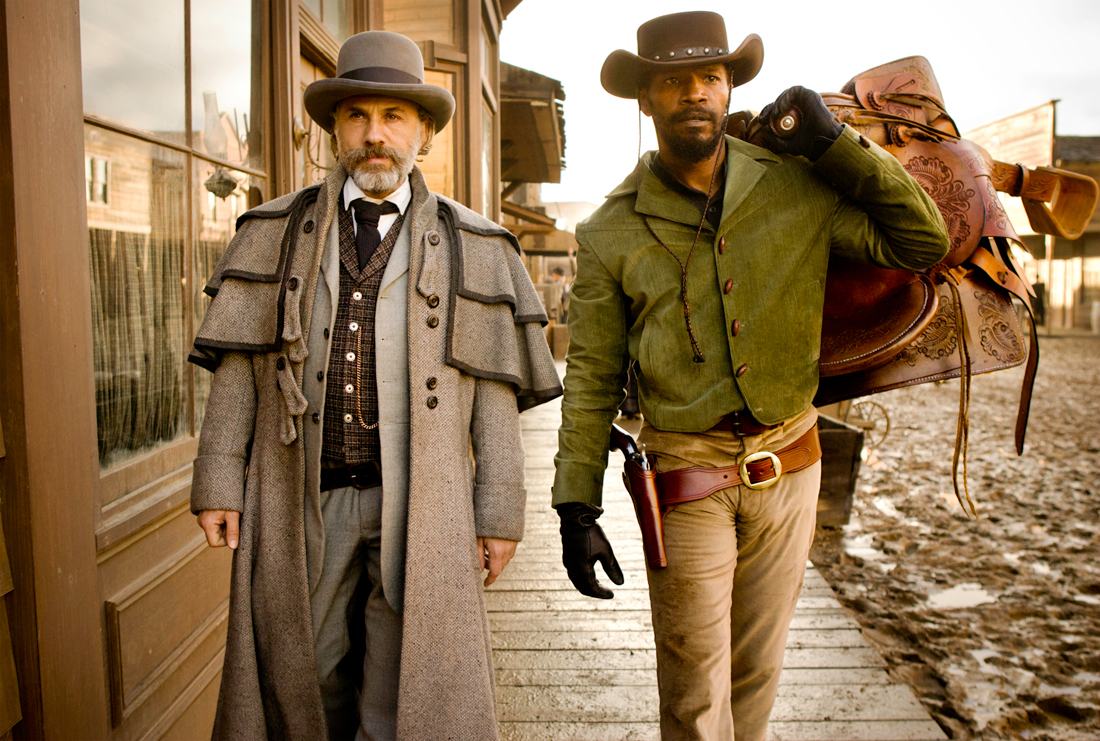Last month, Steven Spielberg put out Lincoln, a movie about the evils of slavery. Predictably, he took a serious, high-minded approach to the issue. This Christmas, Quentin Tarantino also has released a movie on slavery, and just as predictably, he has taken the low road, spinning the subject into a feverish, genre-smashing revenge thriller. Here’s the shock, though: Django Unchained is richer and deeper than Lincoln and a hell of a lot more fun. May the devil claim my soul, I’d rather watch Tarantino’s movie again than Spielberg’s any day.
The story picks up in 1858 in Texas with a slave named Django (Jamie Foxx) being liberated by Dr. King Schultz (Christoph Waltz), a foppish, slavery-hating German dentist-turned-bounty hunter who needs Django to help him track down his next targets. Once those men are dead, Schultz is intrigued to find that Django has a natural talent with a gun. He’s even more intrigued when he learns that Django’s wife (Kerry Washington) is a German-speaking slave christened by her original owners as Broomhilda von Shaft. Convinced that Django is the Siegfried for this Brünnhilde, Schultz vows to help Django rescue “Hildy” from the possession of Mississippi slaveowner Calvin Candie (Leonardo DiCaprio).
Tarantino has always cut the violence in his movies with comedy, but this may just be his funniest movie to date. A white character is named “Dr. King,” while Candie’s plantation is called Candie Land. The newly freed Django picks out an outrageous electric-blue outfit for himself, a great sight gag. A pack of white supremacists complaining about the eyeholes in their hoods makes for a helplessly funny set piece. Playing a good-guy version of the friendly Nazi he portrayed in Tarantino’s Inglourious Basterds, the mustache-stroking Waltz performs a comic tour de force, tempering Schultz’ genial fastidiousness with an endearing crude streak. (Telling Django about the legend of Brünnhilde, he breaks from his reverential account to joke, “It’s a German legend. There’s always a mountain in there somewhere.”) And there’s a delirious montage of Django and Schultz riding the range that’s set to Jim Croce’s “I Got a Name.”
That montage is meant to be ironic — Croce probably wasn’t thinking about contract killers when he wrote that song — but it’s meant to be taken straight as well, capturing Django’s exhilaration at his freedom. Interludes like this are sorely needed to sugarcoat the bitterness at the heart of this film, which comes from its reckoning with America’s sordid racial legacy. We see the twisted people produced by the slave economy in two great Tarantino villains. DiCaprio contributes a steel trap of a performance, creating a bad guy who initially comes off as a pretentious buffoon and then reveals a core of burning hatred in a spectacular scene involving a hammer and a human skull. Samuel L. Jackson delivers a marrow-freezing monologue late in the movie as Candie’s obsequious house slave, who turns out to be possibly more evil than the slaveowners whom he serves.
Be advised: This movie drops the n-word more than all of this year’s other movies put together, and even sympathetic characters use slurs repeatedly. The violence is more than verbal: Tarantino doesn’t stint on the brutality of the whippings, brandings, and other horrors visited on Django, Hildy, and other slaves. We find it hard to watch. So does Schultz, for all his exterior cool. Django doesn’t, though, and he dispassionately explains Schultz’ discomfort at seeing a runaway slave ripped apart by dogs: “He’s just not used to Americans.”
Of course, Tarantino has always been a sadistic bastard, and all this cruelty is meant to gin us up for the finale, when Django takes his ultimate revenge on Candie Land. Yet that’s not all it’s here for. The cruelty is here to drive home the racial violence that has stained our nation’s past, a subject that seems to resonate with Tarantino more than the Holocaust did with him in Inglourious Basterds. We shouldn’t be surprised, given that the director is from Tennessee and all of his movies have been about race relations to some extent. The shootouts, the comedy, the in-jokes and deliberate anachronisms, the triumphant ending –– they’re all here to make this unflattering glimpse of our shared history bearable. Maybe it shouldn’t be bearable. Maybe Spike Lee is right and packaging this subject as entertainment is irresponsible as hell. Even so, I can’t help but be charmed by the stylish, self-assured Django Unchained. In its own cracked way, this movie is Tarantino’s most socially conscious. It’s great fun, too. That combination usually wins.
[box_info]
Django Unchained
Starring Jamie Foxx, Christoph Waltz, and Leonardo DiCaprio. Written and directed by Quentin Tarantino. Rated R.
[/box_info]












